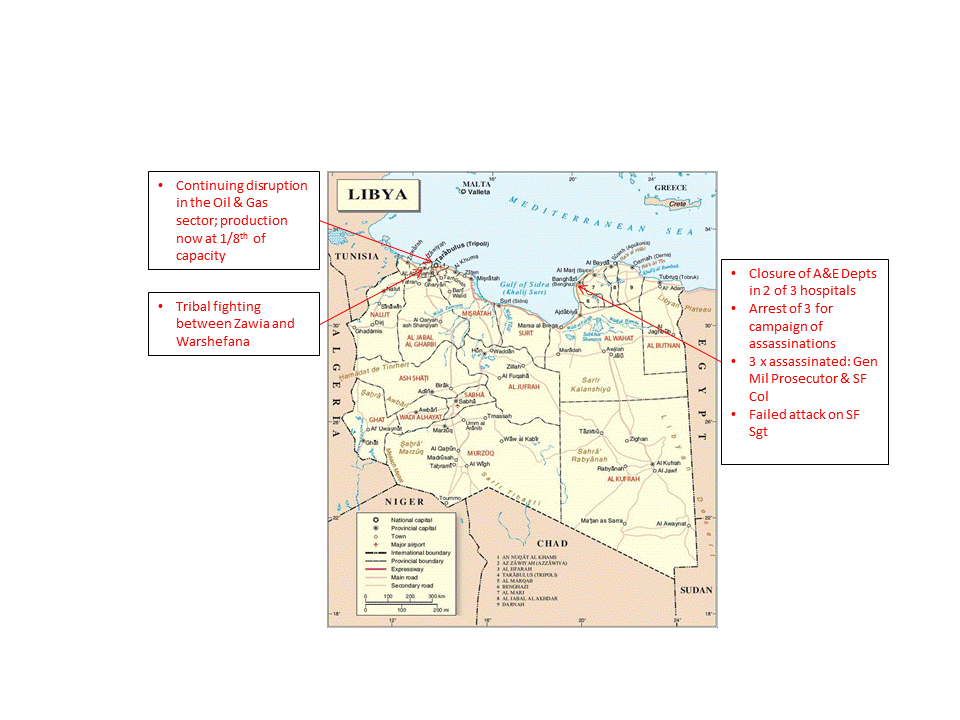Overview
Little has changed since last week in terms of the themes in Libya. The severity of the issue over oil production and exports grows to the point where those not on strike but working in the oil and gas sector are due to strike to express their disgust at those preventing its normal operation by demonstrating outside the General National Congress (GNC) in Tripoli. Production has now fallen to 1/8th of its overall capacity of 1.6 m barrels per day. There are increasing signs of domestic fuel shortages and resultant panic buying.
Moves to try Saif Gaddafi and Al-Senussi have stepped up despite the Zintanis who hold Saif refusing to hand him over to the central government to be tried in Tripoli. This is also contrary to the wishes of the International Criminal Court in The Hague who want him handed over to them. Charges have now been preferred against the two of them as part of a group of 28 of former regime elements to be charged for offences ranging from murder and the incitement of violence and rape.
Benghazi’s targeted killings have also continued this week with further deaths and attempts but also some arrests of some of those believed to be responsible. All the victims are serving or former military and police holding liberal secular views.
Finally there was also confirmation this week from the Libyan government that it would sending large numbers of its armed forces including revolutionaries abroad to be trained in Italy, UK and Turkey. The UK-bound contingent is expected to be trained at the Army Training Regiment in Bassingbourn near Cambridge in basic command and small unit tactics. The courses are believed to be three months long.
Tripolitania (Western Libya)
Attempts were made earlier this week to put an end to inter-tribal fighting between the Zawia and Warshefana tribes. The negotiations have involved the President of the GNC, Nouri Abusahmain and Libya Shield forces also, who took up positions between the two warring factions. The fighting has been centred on Zawia and Maamoura resulting in at least 5 being killed and many others wounded.
There was an interesting report this week in the Libya Herald with the Head of the National Security Directorate in Tripoli, Colonel Mahmoud Sharif, complaining about the lack of resources that the police were receiving to the point where they are having to buy their ammunition on the black market and were receiving inadequate numbers of weapons. Set against the well-armed gangs and militias it does not augur well for stability and prompts the question that if that is the situation with the police in Tripoli then how is it across the rest of the country.
Cyrenaica (Eastern Libya)
The level of violence continues in Benghazi to the point where two of the city’s three hospitals were shut earlier in the week in protest at violence against their staff. Benghazi Medical Centre has been the only Accident and Emergency department open in the city with the result that for several days all but most critical cases were being turned away.
The start of the week saw the arrest of three men on suspicion of having been involved in the recent ongoing campaign of assassinations against current and former members of the armed forces and police. This did not, however, prevent the campaign from continuing.
The General Military Prosecutor Yousef Al-Asayfer was killed along with his brother when their car exploded at the start of the week and then on Sunday, Colonel Alaa Al-Fitouri died in the Benghazi Medical Centre from wounds received when his car exploded. On the same day a retired Special Forces officer was fortunate to escape when an explosive device functioned under his unoccupied car outside his home.





